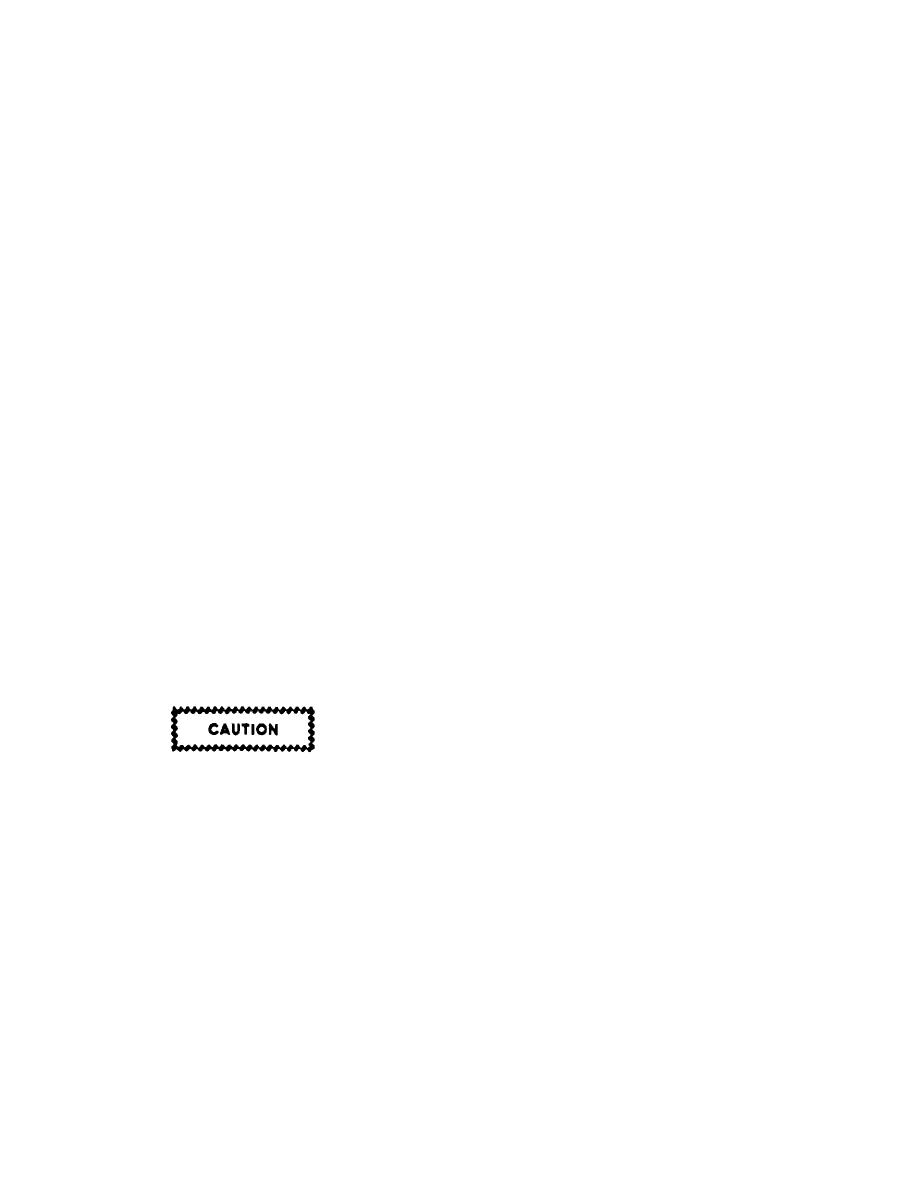 |
|||
|
|
|||
|
|
|||
| ||||||||||
|
|
 operating temperature (about 180 Deg F), as indicated
(10) Engine. Visually inspect engine for obvious
by the gage on the instrument cluster. At operating
indications of damage and insecurely mounted
temperature the cooling system will be under slight
accessories.
Start and operate engine at various
pressure. Inspect radiator, water pump, and hose
speeds, noting response and checking for any unusual
connections for leaks at this time.
noises or sluggishness.
(11) Fuel Tank. Inspect fuel tank, lines and
(4) Engine Oil. Before starting the engine,
fittings for damage and secureness of attachment.
open the right side engine compartment door and check
Replace components and tighten fittings as necessary.
the oil level in the crankcase. The oil fill pipe and
bayonet type dipstick are located on the right side of the
(12) Fuel Pump. Check fuel pump, lines and
crankcase. Add oil meeting the requirements of MIL-L-
fittings for damage and secureness of attachment.
2104 as necessary to bring the level to the upper mark
Observe any indications of looseness, damage or
on the dipstick. Use a grade of oil appropriate to the
leakage. Tighten fittings as necessary.
lowest expected temperature. Never operate the truck
(13) Carburetor. Check carburetor, carburetor
with the oil level below the LOW mark on the dipstick,
mounting, connections and linkages for smoothness of
nor add oil so that the level will be above the upper mark
operation and proper attachment. Inspect for leakage
on the dipstick.
and tighten components as necessary.
(5) Brake System. Check level of brake fluid in
(14) Exhaust Manifold. Check manifold and
brake master cylinder. Maintain level of fluid to within 1/4
gasket for secure mounting. Tighten connections as
inch of top of filler hole with nonpetroleum base hydraulic
necessary.
brake fluid meeting the
requirements of SAE
(15) Muffler. Check muffler for damage, secure
Specification 70R1. Check operation of hand brake and
mounting and connections. Tighten as necessary.
complete hydraulic brake system for leaks.
(16) Radiator. Check radiator mounting and
(6) Hydraulic System Tank. Access to this
hose connections for secure attachment. Check drain
tank is through the left side engine compartment door.
cock for tightness and remove any obstructions between
With fork fully lowered, remove breather cap from tank
core fins. Observe any indications of leakage. Tighten
and check quantity of fluid. Replenish as necessary with
connections or correct discrepancies as necessary.
OE 10 lubricating oil. Check tilt cylinder, hoist cylinder,
(17) Engine Water Pump. Inspect water pump
hydraulic pump, control valve and other components in
for leaks. See that hoses are securely mounted and in
the hydraulic system for leakage.
good condition.
(7) Transmission.
With engine idling, and
(18) Fan and Fan Belt. Inspect fan for secure
transmission in neutral, check level of transmission oil
mounting. Note condition of fan belt and check for one-
with transmission dipstick. Add only OE 10 lubricating oil
inch deflection midway between pulleys. Adjust as
to replenish.
necessary.
(19) Air Cleaner. Inspect air cleaner mounting,
base connections and fittings for secure attachment.
Tighten connections as necessary.
If truck has been serviced for Arctic
(20) Crankcase Breather. Inspect crankcase
conditions(to -65 Deg F) use only
breather for damage and secure mounting.
OES lubricating oil given on the
(21) Distributor Assembly.
Check distributor
lubrication chart. Do not mix the two
assembly mounting and electrical connections for
types of oil recommended for
evidence of damage or insecure attachment. Tighten
different climatic conditions.
connections as necessary.
(8) Steering Gear. Remove floor plate and
(22) Spark Plugs and Cables. Inspect spark
remove plug from steering gear housing. Check that
plugs, cables and connections for tightness, proper fit
lubricant is level with fill hole. Check steering gear,
and obvious damage. Secure in position if necessary.
booster cylinder and all lines and fittings for leakage.
(23) Generator. Check generator for secure
mounting.
Inspect wiring between generator and
(9) Air Cleaner. Inspect oil level of air cleaner.
regulator for looseness or damage. Tighten as needed.
Fill in accordance with lubrication chart.
15
|
|
Privacy Statement - Press Release - Copyright Information. - Contact Us |